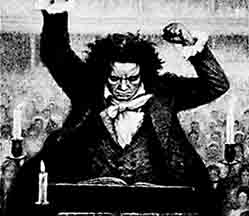Charles V, Holy Roman Emperor from 1519 to 1556, was something of an over-achiever. The heir of Europe’s most powerful and long-lasting dynasties, his empire spanned almost four million square kilometres at its zenith. And despite being perpetually at war, Charles somehow found the time to become an accomplished musician.
“The Emperor understood music, felt and tasted its charms: the friars often discovered him behind the door, as he sat in his own apartment, near the high altar, beating time, and singing in part with the performers,” 16th century Spanish biographer Prudencio de Sandoval wrote. “A composer from Seville, whose name was Guerrero, presented him with a book of Motets and Masses; and when one of these Masses had been sung as a specimen, the Emperor called his confessor and said, ‘See what a thief, what a plagiarist, is this son of a —–! Why here,’ says he, ‘this passage is taken from one composer, and this from another,’ naming them as he went on. All this while the singers stood astonished, as none of them had discovered these thefts, till they were pointed out by the Emperor.”
By the time Charles inherited the Habsburg dynasty from his father, the splendidly named Philip the Handsome, the imperial family’s obsession with music was already the stuff of legend. From the 13th century to the beginning of the 20th, successive rulers lured some of the most eminent singers, musicians and composers – including Mozart, Haydn and Beethoven – into the service of the Habsburg courts, shaping the music of Europe’s most influential cultural centres.
The corpus of music written for court functions includes vast numbers of sacred works, operas, oratorios and chamber works, several of which are to be resurrected live by the Ensemble TRIOthlon this month. Three soloists – Markus Gundermann on violin; Steven Retallick on violoncello, and Anton Isselhardt on flute – will channel a chamber ensemble to present stirring works by Haydn, Bach, Beethoven and Mysliweček.
Beethoven, whose Serenade in D Major is a core part of the concert, was just 13 years old when he petitioned for – and was duly granted – an official salary and position at the electoral court of Cologne. He was so gifted a teacher in piano, theory and composition that, within a few years, three nobles pooled their resources to grant the young composer a pension for life. This despite his dictatorial tendencies: Beethoven once bragged to a friend that he had rapped Archduke Rudolf of Austria over the knuckles for keeping him waiting in an ante-room.
WHO: Ensemble TRIOthlon
WHAT: Music from the Habsburgian Courts
WHERE: Meta House, #37 Sothearos Blvd
WHEN: 8pm June 12
WHY: If it’s good enough for an emperor…
